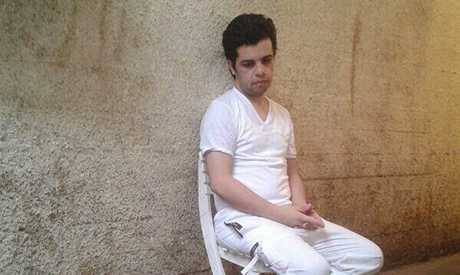Latest NEWS
- Aswat Masriya, the last word
- Roundup of Egypt's press headlines on March 15, 2017
- Roundup of Egypt's press headlines on March 14, 2017
- Former Egyptian President Hosni Mubarak to be released: lawyer
- Roundup of Egypt's press headlines on March 13, 2017
- Egypt's capital set to grow by half a million in 2017
- Egypt's wheat reserves to double with start of harvest -supply min
- Roundup of Egypt's press headlines on March 12, 2017
Hunger-striking Al-Jazeera journalist warns authorities to blame if health fails

A jailed Al-Jazeera journalist, who has been on a hunger strike for more than 100 days, said the Egyptian authorities are to blame if his health worsens, in footage released on Wednesday.
Abdullah El-Shamy has been held in Egypt for almost nine months since he was arrested on 14 August when police dispersed major protest camps in Cairo by supporters of ousted Islamist president Mohamed Morsi, leaving hundreds killed.
The trial of three other Al-Jazeera journalists, detained since December, will resume in Cairo on Thursday
The Qatar-based network said that El-Shamy was moved on Monday from his prison cell to an undisclosed location
El-Shamy, who works for Al-Jazeera Arabic, went on hunger strike on 21 January to protest his detention without charge -- he has yet to face trial.
In a video released by Al-Jazeera and apparently shot in a prison cell, El-Shamy – looking feeble and wearing a white prison uniform – said the footage was recorded as he entered the "106th day of my hunger strike."
"I shoot this video to document my case in case anything happens to me,” he said in the video.
El-Shamy said he had not been referred to any independent doctors or received any medical care since he began his hunger strike, adding that he had filed several official reports to the prosecution "with no response or result."
"Thus I hold the Egyptian prosecution and judiciary responsible if my health deteriorates or anything happens to my safety."
On Tuesday, the France-based Reporters without Borders rights organisation said it was "extremely concerned" about the fate of El-Shamy, urging the authorities to disclose his location and holding them responsible for his life.
His brother Mosaab told AFP on the same day that El-Shamy, who has shed 40 kilogrammes since he began his strike, was in a "critical stage," suffering from anaemia, the start of kidney failure, low blood pressure and hypoglycaemia.
A doctor who reviewed El-Shamy's test results told Al-Jazeera English earlier that the journalist's condition was life-threatening and he could "die within a few days." But another doctor told AFP later that his case would only be life-threatening if he continued his strike without receiving medical attention.
His wife Jihad Khaled has also begun a hunger strike to express solidarity with her husband.
The trial of three other Al-Jazeera journalists, who work for the network's English-language channel and have been held in Egypt since December, will resume on Thursday.
Australian Peter Greste, Egyptian-Canadian Mohamed Fadel Fahmy and Baher Mohamed, and 17 other co-defendants face charges of airing false news and aiding or joining Mohamed Morsi's banned Muslim Brotherhood.
Al-Jazeera strongly denies the accusations made against its staff and has called on the Egyptian authorities to release them immediately.
The trial has sparked an international outcry, with the US, European Union and international rights groups and news organisation calling for their release.










